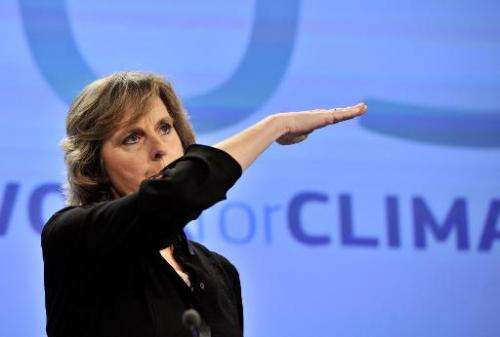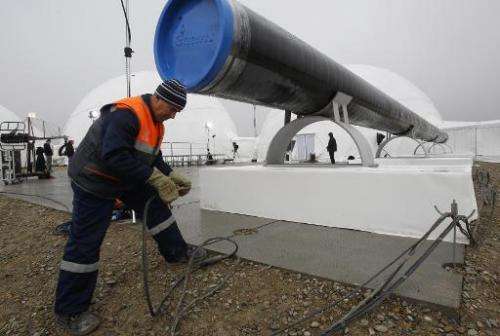Russia crisis boosts EU carbon deal

Worries about energy dependence on Russia have boosted prospects of EU leaders approving a package of proposals to cut carbon emissions by 2030, European Climate Commissioner Connie Hedegaard said Friday.
Speaking to journalists at the latest round of UN climate talks, Hedegaard said the Ukrainian crisis has reinforced convictions that the European Union (EU) must ease its reliance on Russian gas.
This meshed with proposals to reduce the EU's carbon footprint through cleaner energy sources and energy efficiency, she said.
"You cannot think energy security for Europe without making it go hand-in-hand with the climate targets for 2030," Hedegaard told a press conference in Bonn.
"It's inseparable, it goes together."
The EU is one of the big players at the UN climate talks, which aim to forge a global pact in 2015 to reduce greenhouse gases to safer levels.
The European Commission, the EU's executive arm, says the bloc has "over-achieved" on its existing goal of cutting emissions by 20 percent by 2020 from 1990 levels.
In January, it had proposed a further reduction in greenhouse gases, binding for the EU but not national governments, of 40 percent by 2030 over 1990 levels.
Renewables should account for at least 27 percent of the total energy mix by 2030, the commission suggested at the time. But the scheme ran into resistance.

Some countries baulked at the cost at a time that many EU economies are still struggling to haul themselves out of recession. In March, EU leaders decided to delay a decision on the 2030 package until October.
"I would say that there are good prospects for the European Council (comprised of heads of state and government of EU members) standing by their promise to agree on this in October," said Hedegaard.
"We have seen since the commission presented this back in January that, also because of the conflict—the crisis around Russia, Ukraine—there is an even stronger wish to focus on how to become more energy-efficient in Europe, how to have a stronger focus on how to have indigenous sources, renewables, things like that.
"I don't think the appetite for addressing this has diminished. If anything it has gone the other way," argued Hedegaard.
"Some of the member states in Europe who are most dependent on imported fossil fuels from Russia happen also to be some of the member states that are least energy-efficient," she added.
Many financial mechanisms, such as the European Investment Bank (EIB) exist to help poorer EU members overcome infrastructure problems, said the commissioner.
Russia provides a quarter of the EU's needs in gas overall, but this rises to 100 percent in some eastern European countries whose energy infrastructure dates to Soviet times.
© 2014 AFP




















